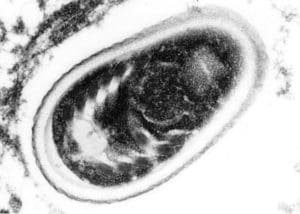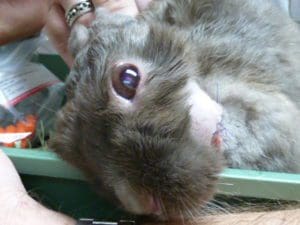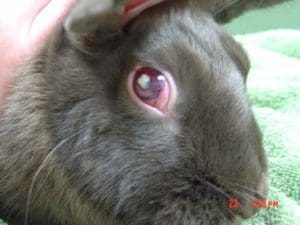Encephalizotoonosis (aka ECUN)

photo courtesy dailyparasite.blogspot.com
This is a very common infection in domestic rabbits, guinea pigs and other small mammals. It is caused by an intracellular parasite: Encephalitozoon cuniculi; about 50% of rabbits demonstrate exposure to the parasite. Spores are shed in the urine and infection usually occurs via ingestion of contaminated food or water. It is a very resistant parasite and can survive up to 4 weeks in the environment. It primarily targets the central nervous system, the kidneys, and the eyes.
Neurological signs are the most common: head tilt, uncoordination, circling, rolling, and involuntary eye movements. Paresis or paralysis of one or both hind legs, seizures, and behavioral changes are also commonly seen. The degree of torticollis (head tilt) can be an important prognostic factor. Not all infected rabbits will show clinical signs of disease; carriers and asymptomatic infections are very common.

This rabbit has head tilt associated with E. cuniculi. The sutures are from surgery for an unrelated jaw abscess.
Rabbits suffering from chronic kidney disease often show non-specific signs such as lethargy, weight loss, and reduced to no appetite. Increased water intake and urination and urinary incontinence may or may not be present and urine staining of the fur is also commonly seen. A high percentage of cases also show eye lesions or even blindness. Usually one eye is affected and in some case surgically removing the eye might be the best treatment option.

This rabbit has uveitis and pus in the eye due to E. cuniculi.
There are other diseases that show neurological signs such as head tilt, including bacterial (Pasteurella), viral, and parasitic among others. At Exotic Vet Care we use multiple tests to obtain a definite diagnosis; if positive the test is repeated in 4 weeks to see if the rabbit’s immune system is reacting to the organism. In some cases we can test the urine of suspect rabbits but false negative results can occur if the organism is not being shed.
Treatment aims at reducing inflammation and blocking spore formation. Fluid support and assisted feeding are mandatory to correct dehydration and for appropriate intensive care. As always the sooner your rabbit is diagnosed the better his chances at recovery. Many rabbits, despite treatment, do not improve clinically because irreversible changes and damage to the organs have already occurred.

About Us
Our exotic animal hospital is dedicated exclusively to the care of birds, exotic small mammals, reptiles, and even fish! We can offer everything your pet needs for a healthy and happy life, from wellness care and grooming to diagnostics and dentistry, but we can also provide emergency care during our operating hours, along with specialized treatment for referred patients.
